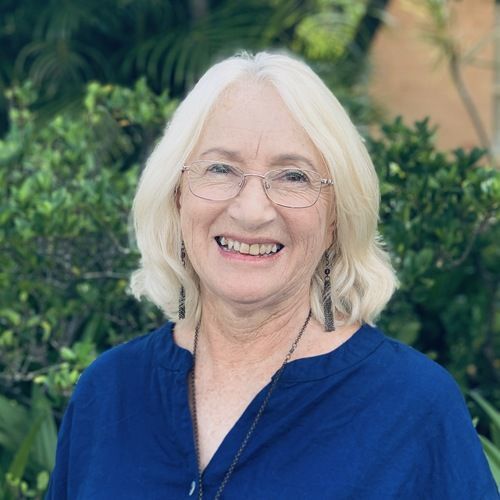Our Stories
Dianne Priest
COACH Coordinator

Missionary Life
“How can they hear without a preacher?”
Hi! My name is Dianne Priest and I’ve been working here as the COACH Family Mentoring Coordinator for just over 12 months. My home state is Tasmania and my husband and I met and married in the quaint country town of Deloraine, nestled in close to the beautiful mountains that we loved to explore often. Within a few years of married life, we took up the challenge of training to become cross-cultural missionaries. We completed Bible School, Missionary Training, Translation and Linguistics training and after deputation decided to head to PNG where we were based on the island of New Britain for over 8 years.
As a trained teacher, I was quickly absorbed into the ministry of helping to build a school on the base for local and missionary children. It was an amazing multi-cultural mix of students, families and teachers who came from as far as the Faroa Islands, USA, Germany, Canada, England, Holland, Australia, and New Zealand, to name a few. It was quite a challenge for me to develop a suitable curriculum, train the teachers and build a school community with such diversity. Phil, my husband, quickly found himself heading up the supply department where he provided all the missionary families on the base and in the remote locations with all that they needed to live day to day. He had quite a few adventures with helicopters, flooded rivers, washed out roads and wild ocean storms as he creatively found ways to get the supplies to those who needed them.
He also became a member of the leadership team, and he enjoyed the role of conducting surveys, hiking into remote areas, finding people groups who had never seen a white person. The mission we were part of would only go in and settle missionary families with tribal groups that invited them. He can testify to God’s work of preparing hearts to welcome the gospel when it was taught to tribes in their own language, respecting their culture and by missionaries who lived in the midst earning the right to share God’s truth by the quality of their lives. We also assisted with pastoral care for the missionaries in the remote locations. We’d regularly hike, fly, boat and drive through the rugged jungle mountainous landscape to spend quality time encouraging families living in very isolated places learning language and sharing the gospel.
All the while, we were raising our three young boys during this wonderful season, and they still consider it was the best childhood they could ever have experienced. I think the machetes and slingshots, helicopter rides and hikes had a big part to play. Plus swimming in warm oceans every afternoon as part of daily PE. Oh, and climbing a few coconut trees and generally having way too much fun.
We eventually returned to our home state of Tasmania due to the impact of severe and constant bouts of malaria that debilitated Phil’s health and wellbeing. The boys it must be noted struggled to understand that school lasted all day in Tasmania and did not include beach time.
We then began a journey of adjustments to life in Australia that was unexpectedly harder to navigate than we anticipated. I think it’s called reverse culture shock. It’s real, but that’s for another chapter in the story.
“How can they hear without a preacher?”
Hi! My name is Dianne Priest and I’ve been working here as the COACH Family Mentoring Coordinator for just over 12 months. My home state is Tasmania and my husband and I met and married in the quaint country town of Deloraine, nestled in close to the beautiful mountains that we loved to explore often. Within a few years of married life, we took up the challenge of training to become cross-cultural missionaries. We completed Bible School, Missionary Training, Translation and Linguistics training and after deputation decided to head to PNG where we were based on the island of New Britain for over 8 years.
As a trained teacher, I was quickly absorbed into the ministry of helping to build a school on the base for local and missionary children. It was an amazing multi-cultural mix of students, families and teachers who came from as far as the Faroa Islands, USA, Germany, Canada, England, Holland, Australia, and New Zealand, to name a few. It was quite a challenge for me to develop a suitable curriculum, train the teachers and build a school community with such diversity. Phil, my husband, quickly found himself heading up the supply department where he provided all the missionary families on the base and in the remote locations with all that they needed to live day to day. He had quite a few adventures with helicopters, flooded rivers, washed out roads and wild ocean storms as he creatively found ways to get the supplies to those who needed them.
He also became a member of the leadership team, and he enjoyed the role of conducting surveys, hiking into remote areas, finding people groups who had never seen a white person. The mission we were part of would only go in and settle missionary families with tribal groups that invited them. He can testify to God’s work of preparing hearts to welcome the gospel when it was taught to tribes in their own language, respecting their culture and by missionaries who lived in the midst earning the right to share God’s truth by the quality of their lives. We also assisted with pastoral care for the missionaries in the remote locations. We’d regularly hike, fly, boat and drive through the rugged jungle mountainous landscape to spend quality time encouraging families living in very isolated places learning language and sharing the gospel.
All the while, we were raising our three young boys during this wonderful season, and they still consider it was the best childhood they could ever have experienced. I think the machetes and slingshots, helicopter rides and hikes had a big part to play. Plus swimming in warm oceans every afternoon as part of daily PE. Oh, and climbing a few coconut trees and generally having way too much fun.
We eventually returned to our home state of Tasmania due to the impact of severe and constant bouts of malaria that debilitated Phil’s health and wellbeing. The boys it must be noted struggled to understand that school lasted all day in Tasmania and did not include beach time.
We then began a journey of adjustments to life in Australia that was unexpectedly harder to navigate than we anticipated. I think it’s called reverse culture shock. It’s real, but that’s for another chapter in the story.
Posted in Our Stories
